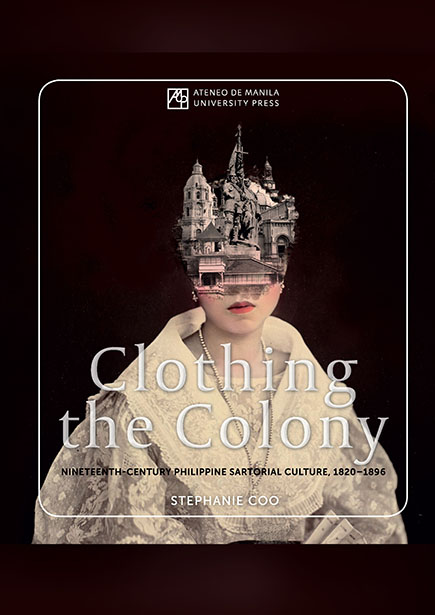Clothing the Colony: Nineteenth-Century Philippine Sartorial Culture, 1820-1896
“This book is, to date, the most comprehensive and rigorously-researched study on the forms of dress worn by almost all types and classes of inhabitants of the Philippines under Spain from 1820 to 1896. Using an interdisciplinary approach, it systematically and perspicaciously shows the inextricable links between these attires and the rapidly changing economic, political, religious, and social conditions of the nineteenth century, which, among others, witnessed the opening of the islands to international trade, the consequent rise of a mestizo elite, and the formation of groups of Filipinos who would eventually assert their identity through the ideology of reform, and later, revolution at century’s end. Written in a lucid style and appropriately documented with prints and photographs of the period, this work is an indispensable source book for all artists who design for theater, film, television, and the fashion industry, as well as historians of all persuasions and Filipinophiles of all nations.”
—NICANOR G. TIONGSON, PhD, professor emeritus
University of the Philippines-Diliman
“Encyclopedic and erudite, this study reveals a rapidly changing society where increasing affluence, higher education, and more travel are transforming dressing rules decreed by custom, ethnicity, and inherited status.
A must-read for anyone who seeks to understand our coming-to-be as a Nation.
Mabuhay ang wastong pananamit!”
—FERNANDO NAKPIL ZIALCITA, PhD, professor emeritus
Ateneo de Manila University
“Clothing the Colony is as elegant as the subject it explores. S. Coo’s trained and keen eye literally disassembles and reassembles the clothes Filipinos wore in the last decades of Spanish rule. Thus, she offers a subtle and fluid pattern of the colonial social fabric in late nineteenth-century Philippines.”
—XAVIER HUETZ DE LEMPS, PhD, professor
Université Nice Sophia Antipolis/Université Côte d’Azur
“The book is an interesting documentation of clothing and its interplay with race and class in the midst of socio-economic changes of the nineteenth century. Coo effectively uses clothes as text for reconstructing the social history of the Philippines in most of the nineteenth century.”
—MA. LUISA T. CAMAGAY, PhD, professor
University of the Philippines-Diliman
“This is a marvelous and timely book with a wide multidisciplinary scope and a tight historical focus on the micro-politics of Filipino colonial clothing practices. It is history at its very best, enriching the purview of Philippine historiography by digging into both forms of resistance and of public affirmation of social status.”
—ARMANDO MARQUES GUEDES, PhD, professor
Universidade Nova de Lisboa
—NICANOR G. TIONGSON, PhD, professor emeritus
University of the Philippines-Diliman
“Encyclopedic and erudite, this study reveals a rapidly changing society where increasing affluence, higher education, and more travel are transforming dressing rules decreed by custom, ethnicity, and inherited status.
A must-read for anyone who seeks to understand our coming-to-be as a Nation.
Mabuhay ang wastong pananamit!”
—FERNANDO NAKPIL ZIALCITA, PhD, professor emeritus
Ateneo de Manila University
“Clothing the Colony is as elegant as the subject it explores. S. Coo’s trained and keen eye literally disassembles and reassembles the clothes Filipinos wore in the last decades of Spanish rule. Thus, she offers a subtle and fluid pattern of the colonial social fabric in late nineteenth-century Philippines.”
—XAVIER HUETZ DE LEMPS, PhD, professor
Université Nice Sophia Antipolis/Université Côte d’Azur
“The book is an interesting documentation of clothing and its interplay with race and class in the midst of socio-economic changes of the nineteenth century. Coo effectively uses clothes as text for reconstructing the social history of the Philippines in most of the nineteenth century.”
—MA. LUISA T. CAMAGAY, PhD, professor
University of the Philippines-Diliman
“This is a marvelous and timely book with a wide multidisciplinary scope and a tight historical focus on the micro-politics of Filipino colonial clothing practices. It is history at its very best, enriching the purview of Philippine historiography by digging into both forms of resistance and of public affirmation of social status.”
—ARMANDO MARQUES GUEDES, PhD, professor
Universidade Nova de Lisboa

Publisher
Ateneo de Manila University Press
ISBN
978-971-550-891-9
Published
2019
Specialisation
Humanities
Theme
History
Region
Philippines